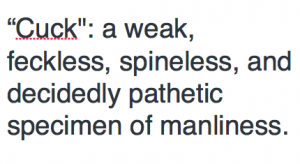
Let’s have a little chat about patriarchy. It’s a great little word, except that in some ways it’s misleading.
Pull it apart and what you have is “father-rule.” Who gets to be in charge? Dads. Works for me.
But if you really want to understand patriarchy you have to go a lot further. And you should want to. Because if you have any interest in getting your head around what’s going on in the Bible—and the ministry of Jesus in particular—then you need to get your head around this.
Patriarchy 101
A lot of folks will use the word “patriarchy” to talk about male rule, and those indications that a lot of society (or an ancient text) is biased toward men. That’s a good start.
Read the Hebrew Bible/Old Testament, for instance, and you might notice that the commandments are all given to men: “You shall not covet your neighbor’s wife,” “You shall not lie with a man as one lies with a woman.”
Patriarchy means not only that men occupy the official positions of power but also that they are the ideal, responsible moral agents.
In part this is because women are usually envisioned as belonging to a man. You know how a traditional wedding would have a moment when the minister asks, “Who gives this woman to be married?” Yeah. That. It’s a relic of the time when a woman was property being transferred.
The notion of women as property subject to men explains why a rapist is commanded to pay the bride price, marry his victim, and keep her forever (Deuteronomy 22:28-29). You can’t damage a man’s property and then just leave her in a condition where no other man would take her off of daddy’s hands.
And that whole, “wives submit to your husbands” thing. That, too. But this brings us to the cusp of the really interesting stuff.
Patriarchy 201
Patriarchy wasn’t just about men being in charge. It was a whole system of power and submission. The clearest place to see this is in the household codes.
In Ephesians, Colossians, 1 Peter and elsewhere you can find people paired in relationships and given instructions for those particular social locations. The basic set of household relationships was husbands and wives, parents and children, masters and slaves. 
When we are talking about ancient patriarchy we are talking about this whole set of power relations. In a rightly ordered home husbands, parents, and masters rule, while wives, children, and slaves submit.
But this is only the beginning. Because a household so ordered is the building block of a larger society in which people rightly hold and submit to power. It is no accident that 1 Peter 2-3 includes its instructions about submitting to government right before its instructions on submission in the home. Rulers must rule, and the subject peoples must be good subjects. Rome must rule and the barbarians must submit.
Patriarchy is about ordering power from the top of the proverbial food chain all the way down to the bottom. And an ancient would say that this is “rightly” ordering power.
Patriarchy 301
“Rightly” ordering power? Yes. Because who is in charge and who submits is not a matter of accidents of history. It is not a matter of pragmatics. In a patriarchal system the people who rule, in every set of relationships, are considered inherently superior because they are more manly.
When Aristotle is laying this all out for us in his Politics, he says that in any relationship there is one who is by nature superior and the other inferior. A rightly ordered world is one in which the superiors (males, Greeks then Romans, senatorial class, husbands, masters, parents) rule their inferiors (females, barbarians, plebeians, wives, slaves, children).
This brings us to the really, really interesting stuff. Because there are reasons tied to this “inherent superiority.” Beyond male and female and beyond social relationships of ruler and ruled, there is a whole series of binaries. In each pair, one is considered inherently better than the other. And in each pair this better option is considered to be more manly or more characteristic of males:
- Male — Female
- Rule — Submission
- Strong — Weak
- Reason — Passion
- Stolid — Emotional
- Mental Foresight — Bodily Implementation
- Hard — Soft
- Wisdom — Folly
- Virtue — Vice
The man at the top of the pyramid, the Emperor, is supposed to be the epitome of manliness: the one who rules over all other men, is strongest and most virtuous. As the Priene inscription describes Augustus: the most perfect consummation of human life.
Depending on how much time you’ve spent around locker rooms (or political discourse) you might expect that with so much riding on gendered enactment that a significant component of life for men in the Roman world is spent maintaining the delicate stock of manly capital they had acquired. At times this meant making sure to keep such stock from others.
Which brings us to Jesus.
Conquer or Be Feminized
One of the most well-worn things to say about the surprise of Jesus’s ministry is “he didn’t come to conquer the Romans.” Maybe now we can begin to see that rejecting the manliness of conquest meant that Jesus embraced what would have been seen as a deeply feminizing narrative.
When you say that you didn’t come to be served but to serve, that means you’re voluntarily descending the social pecking order. Remember: in the patriarchal pecking order, not only are men in charge but also the higher up on the pecking order you are the more manly you are.
To be a servant meant that women could boss you around. That meant you had lost all your masculinity. That’s why Romans didn’t care if owners had sex with their male slaves: the slaves were lower on the pecking order (pun intended).
To be Roman was to be more manly than the barbarian nations. Because Rome had won the war, the subject people had lost. To receive the bodily defeat of death at the hands of a Roman soldier was to be wrapped up in this feminization.
Check out the relief by Aphrodisias to the right. A soldier who barely passes the “no shoes, no shirt, no service” requirement is violently poised over an exposed woman. This is not a celebration of Roman men’s ability to rape random women. It is a commemoration of Claudius’s conquest of Britainia. “Girly” countries get beaten up, subjugated. Note the way that this relief literalizes the physical language of being brought “under” the control of “manly” Rome. Britania has no manliness after manly Rome has its way with her. (HT: Davida Lopez.)
To be a man means to be firm, hard, muscular. Real men aren’t penetrated. To be crucified means that some other man has penetrated you with nails and taken away all your agency. In being crucified Jesus was feminized in every way other than being sexually penetrated.
When Paul says that the cross is foolishness and weakness, in the gender-coded world of the first-century Roman Empire that would have communicated that the worldly measure of the gospel is womanly. “Wisdom” and “strength” are on display in the power to take life.
This is the weakness and shame that Paul then calls the wisdom and power of God. Because it is this cuck Christology that God uses to save the world.
The Manly Gospel
This is not to say that a manly gospel message is completely absent from the Gospels. Of course it is present. It is present in the presumptions of the disciples that Jesus rejects and rebukes.
“What were you arguing about on the road?” “Um… we were sort of talking about which of us is greatest…” The disciples are wanting to use the Jesus movement to create their own scale of ascension (manliness). Then Jesus takes a child and puts it in the middle of them and says: This is greatness in the kingdom of God. 
Greatness is playing the role of someone who could be ordered about by slaves and (*gasp!*) women. A child. He might as well have said, “If anyone wants to be my disciple he has to lay aside his life…” er… I mean… “he has to lay aside his manliness.”
Then there’s the time when James and John come looking for the glory. They want to climb that patriarchal ladder: “Let us sit at your right hand and your left!” Jesus says, “That’s not how it’s done here. The rulers of the gentiles lord it over them, but if you want to be great, you must be last and servant of all.”
There it is again. Playing the role of the feminized member of the household: a servant, someone who could be bossed around by a woman. Someone who would be screwed by his master literally and figuratively.
Losing It
The patriarchal narrative is alive and well. The idea that manly men should be in charge of their women lives—overtly and proudly in many buildings with crosses on top, more subtly in other social institutions.
But from the beginning Christians have told a narrative that flips the world’s scripts, institutes an upside down economy. Jesus walks an alt path to power and glory: by laying it all down.
And in a world where power is equated with gender, this is a deeply feminizing narrative. It is an enactment of subordination fit for women.
It looks like the odious claims of the Christian message might be in a good spot to make a comeback. If we can engage that nagging feeling that this is all deeply wrong somehow, we might experience the offense of the gospel for the first time. This might be just the sort of stumbling block we need.
Turn the other cheek, indeed.











